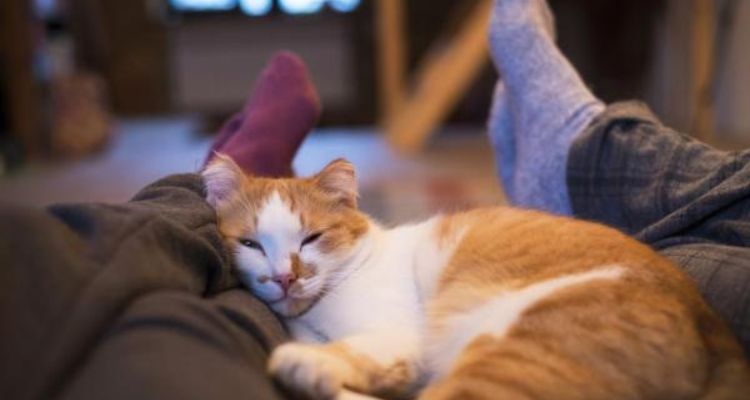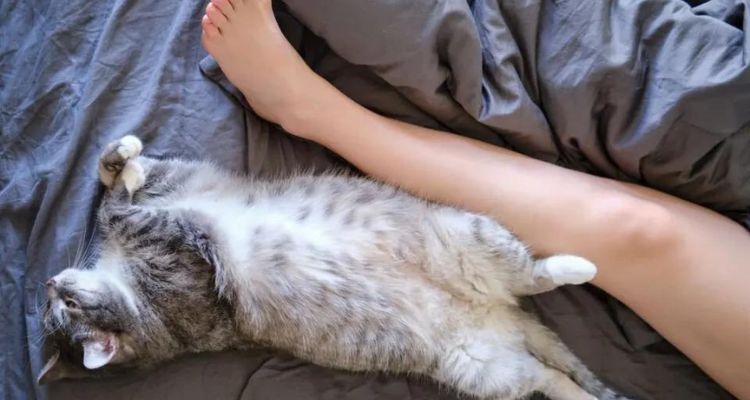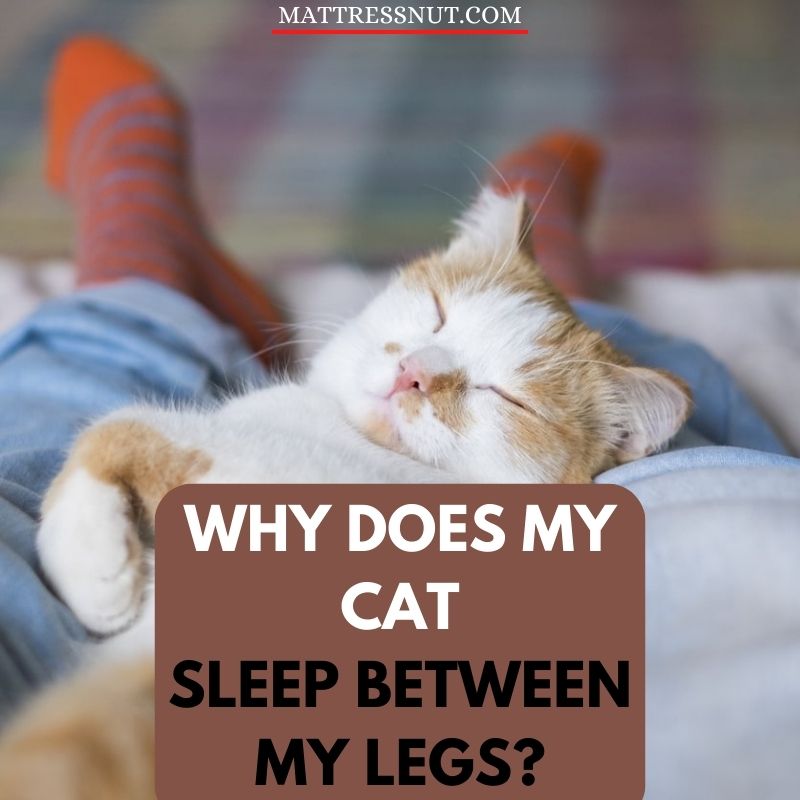Everyone loves to have a cat at home due to its friendly nature. They are a continuous source of amusement with their odd yet loveable behavior. We sometimes may not like many of their doings, but we still love them in all ways. Their sleeping habits are very different and even more questionable than most animals.
You may have wondered many times, whether you own a cat yourself or not, why most cats like sleeping between legs. Well, there are many reasons for that, as there isn’t just a single reason for such conduct.
Continue reading below to find out why your cat sleeps between the legs.
Why Does My Cat Like Sleeping Between My Legs?
There are many logical reasons for that to happen. They do not do it without any explanation, as we mostly assume about their many other actions.

Warmth
Cats love sleeping between legs because they feel warm. A study by PETMD shows that cats have a normal body temperature of 37.5 to 39 degree Celsius or 99.5 to 102.5 Fahrenheit approx.
Your cat, on average, has a core body temperature higher than yours, and they need a quick way to maintain it. They can naturally maintain this temperature with the help of their intelligence or bodily process. Therefore, sleeping between your legs will help them attain that warmth.
However, during the day, they might look for a nice and comfy sunshine spot if you allow them to go outside on safe premises. But the warmth usually goes away at night, forcing them to go nowhere else but to sleep between your legs for the same warmth and comfort. Cats typically choose a place to sleep, which mostly looks uncomfortable to us.
Deeper Sleep
A domestic cat does not worry much about becoming prey to a larger wild animal. These cats find it necessary to sleep as it is instinctual for them to fulfill their sleep despite the need to defend themselves. So, when they need to rest more deeply, they usually look for extra safety when they are more open to a dangerous situation.
Kittens sleep with their mothers to achieve more comfortable and deep sleep. However, adult cats sleep close to one another and cannot curl up with them.
Cats must have a deep sleep. Like us humans, this leads toward their natural growth, healing, and development by regaining their lost energy. This way, they wake up more energized and fully alert to deal with any situation.
Another commonly seen sleep cycle associated with cats is REM. In this sleep cycle, a cat dreams, which activates its learning and memory capabilities in a more enhanced way. Therefore, like humans, cats also need deep sleep to grow, learn, and develop together for a normal life. They would feel less energetic and even fatigued due to lack of sleep.
Security and Bonding
This cycle works similarly to what we humans have among ourselves. If we take care of each other, it will strengthen our bond together. Similarly, taking good care of your cat means creating a bond with them. This will make them feel safer and more trustworthy toward you. That is why they find it more comfortable to sleep between your legs.
However, wild cats sleep together or close to each other to create a family-like bond. Domestic cats use this pillowing behavior with other cats living in the same household or as an alternative to humans.
When you have more than one cat, they will use each other as a pillow to keep themselves warm. However, when you own only a single cat, it will create a bond with you.
Providing Comfort
You’ll find it surprising that your cat can empathize with you when you are not feeling well. Yes, in the same case as we humans have, your cat will sit between your legs and purr. They do that to show their affection and feelings for your well-being as they are sensitive towards you. The reason for such behavior is to show sympathetic feelings so that you can feel better.
However, sometimes cats may not show such affection towards you. This could signify that you have yet to create a positive bond with them, or they are probably new to you.
So, in such situations, do not expect them to show sympathy; you should not take it as a sign of a problem with your cat. As the normal cycle works with us humans, it’s the same with cats or other animals.
Territory
Other than sleeping between your legs to attain warmth or affection, your cat can do that to claim ownership of you and your bed. Yes, cats are mostly territorial animals; therefore, they leave their mark around different spots in your house.
They leave these marks in varying spots as a clear indication. However, if you own more than one cat, they may compete. They practice these activities to fix a sleeping area that could include your legs too.

Another surprising thing you may notice is when you have multiple cats at home. If one cat settles down between your legs, another may come and push it away. They do that to show the other cats that they have claim over this spot and no one else can have it.
Cats will leave pheromones at a particular area of choice to claim as their territory, including you. Sometimes your cat may start rubbing itself with your legs or face before settling down.
They Need a Higher Point
Cats always stay high alert by nature and are also very observant. They would like a place to settle in and have their eyes and ears on everything happening. That usually occurs due to their strong attachment to their hunter instincts which demand such actions.
These hunting instincts are not just a luck blow for them which they get from living inside a house. They survey their surroundings entirely with their ability to work and keep an eye on their prey like predators.
When they sleep between your legs, it brings a sense of contentment to them that they have all under their observation. This gets them comfort in knowing in their mind that everything is happening under their watch. They can quickly jump in or out of the situation if anything happens. So, sleeping between your legs works like a vantage point for cats.
Stress and Anxiety
Many cat owners would not even know their cats can suffer from stress and anxiety. We normally associate these mental problems with us, humans only. You may think your cat always stays close to you because she loves you. But that may only be the case as sometimes it can be a serious situation.
Cats suffer from separation anxiety due to stress or other health issues. If your kitten is anxious, it will become more territorial and dependent on you. Your cat will do it by sleeping as close to you as it can.
Luckily, if you can figure it out, try to control the stress factor. You may start by observing the change in the cat food, as this can cause stress and discomfort. Even a difference in their litter may become a cause of the issue.
Why does my cat knead me when sleeping between my legs?
Kneading while sleeping between your legs is an instinctual behavior for cats. Kittens knead their mother’s belly to stimulate milk flow while nursing. Adult cats continue this behavior as it is calming and comforting for them. The motion of kneading releases endorphins that relax cats. Kneading while between your legs allows your cat to bond with you and signals contentment.
Why does my cat drool when sleeping between my legs?
Excessive drooling between your legs while sleeping may indicate a medical issue like nausea, oral pain, or dental disease. But some normal reasons for cat drooling during sleep include relaxation, hairballs, and dreaming. The warmth and motion of your body when cat naps between your legs can induce a deep sleep where dreaming and drooling occurs. As long as your cat seems healthy otherwise, drooling is usually nothing to worry about.
Trust Yourself
Your cat will mostly use your legs for warmth, as explained before. It will only do that if they have built some level of trust to do so. Know that suspicion and distrust are in most cats’ nature by default. These are important survival instincts and tools for wild cats, and your domestic cat will also have them to some extent.
If you have adopted the cat from a sheltered place, it needs better socializing before getting mixed up in your environment. Your cat will find it hard to trust you; however, you can do it by taking proper care of it.
When it comes to sleeping between your legs, it’s only when they have built enough trust levels with you. Even if resting on or in between your legs should be enough evidence for you as proof. Simply put, your legs are their first preference at any point or condition.
Your cat should not worry about anything once it is in your legs. There are many more reasons for a cat to express their trust in you, and sleeping between your legs is one of them.
Conclusion
You may feel worried when your cat tries sleeping between or over your legs. However, it’s nothing serious to worry about as it’s just normal behavior from their side. Sometimes, your cat will do that out of needing a warm spot to sleep in or out of affection. Therefore, you must take care of them the way they react or behave by closely observing their certain actions.
You can arrange some comfortable sleep points if you don’t want them to sleep between their legs. You must provide warmth and affection for your cat to sleep comfortably with safety and security.
References
https://www.petmd.com/cat/conditions/immune/fever-cats
https://pubmed.ncbi.nlm.nih.gov/2322413/
Why does my cat sleep between my legs FAQs
What Does It Mean When A Cat Lies Between Your Legs?
When it lies or sleeps between your legs, it mainly indicates that they feel safe and comfortable. It could also be due to the warmth they need but can’t find elsewhere. However, it’s just normal behavior, nothing to worry about.
Why Does My Cat Sleep Behind My Legs?
When it tries to sleep behind your legs, they look for safety and security. Your cat will often try to find a safe and comfortable spot when they think things are uncertain or troubling them. When they do that, they think you are their best bet.
Does A Cat Trust You If It Sleeps Next To You?
Your cat will only sleep near or even on you if they trust you; otherwise, it will look for another spot. Therefore, you must keep their trust and don’t do anything to scare them off. Apart from the trust factor, it could be because they look for warmth at sleep time which they can find sleeping on or next to you.

